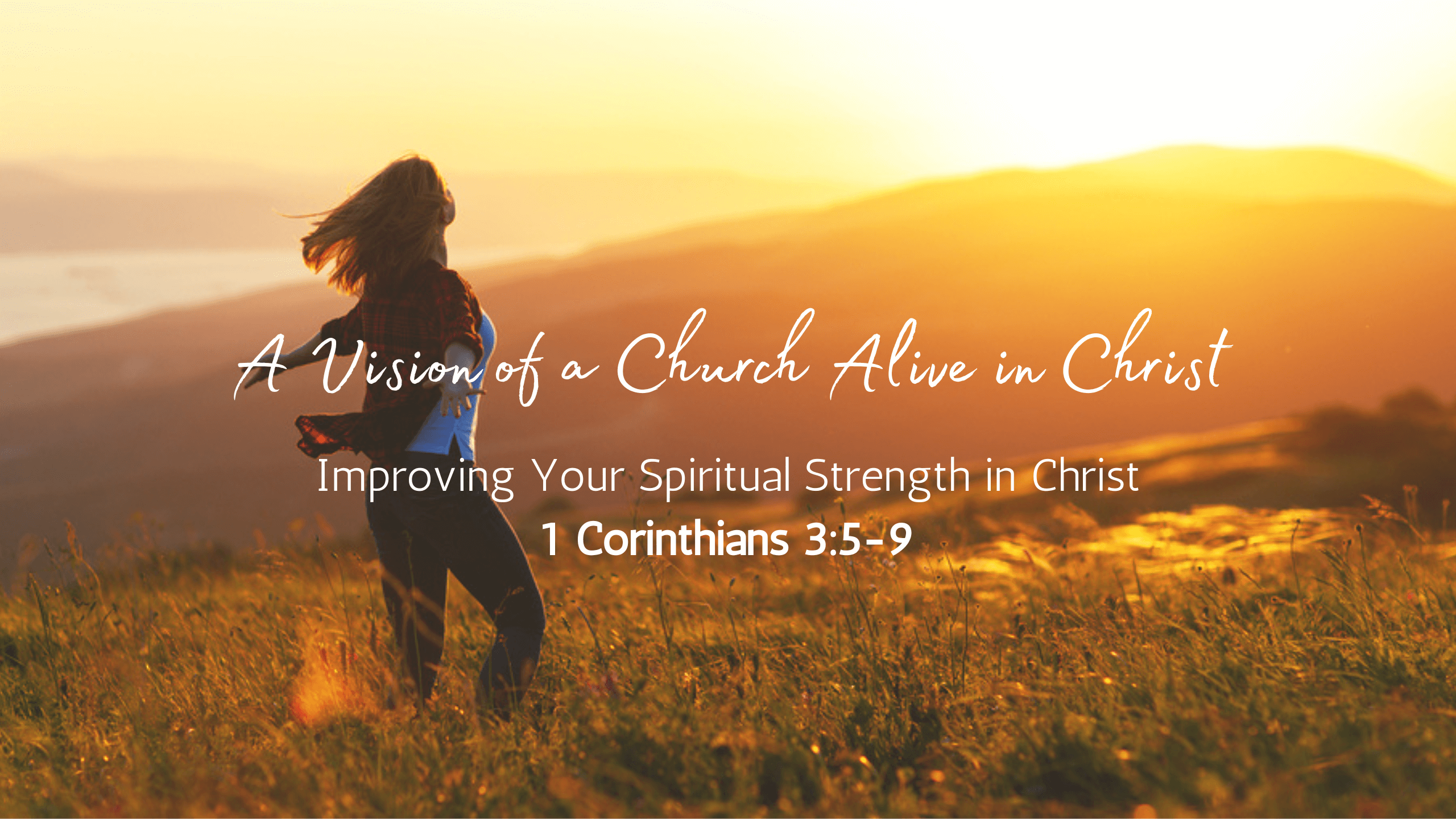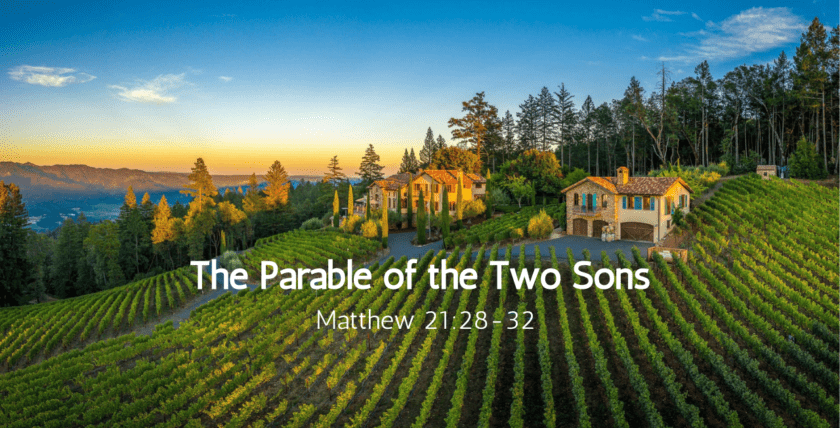Welcome to this episode of Sonday Life. It’s great to be here with you again. I appreciate that you’re here with me as we look into God’s word for our life and growth in our relationship with Jesus Christ. I’m very fortunate to have the opportunity to speak with you again.
This is the third episode of our six-part series, “A Vision of a Church Alive in Christ.” This episode is entitled *“Improving Your Spiritual Strength in Christ?” In the last episode, “Assessing Who we are in Christ,” we answered two questions; 1) Who are we actually as believers in Christ? And 2) Who are we supposed to be as believers in Christ? We talked about assessing our current spiritual growth as a believer in Christ. If you missed the previous episodes in this series, I’ve put a link in the notes below.
Once we’ve been able to assess where we are in our spiritual growth, we then need to know how we’ll grow stronger in our relationship with Christ and others. By the end of this episode, you will know how to improve your spiritual strength in Christ. For this series, we’re using what Paul told the believers in Corinth, a church he planted, lived with, and taught for a year and a half, about being alive in Christ from 1 Corinthians 3:1-16. In this episode, we’re going to look at 1 Corinthians 3:5-9 and see what Paul had to say to the Corinthians about growing spiritually. Let’s read what he said;
“What, after all, is Apollos? And what is Paul? Only servants, through whom you came to believe – as the Lord has assigned each a task. I planted the seed, and Apollos watered it, but God has been making it grow. So neither the one who plants nor waters are anything, but only God, who makes things grow. The one who plants and the one who waters have one purpose, and they will each be rewarded according to their own labor. For we are co-workers in God’s service; you are God’s field, God’s building.”
For many of you, you’re probably asking, “Who is Apollos?” He was a well-educated Jewish convert from Alexandria, Egypt. Alexandria had a very prominent school of philosophy and debate. It’s where all the rich kids went to get smart and learn to argue with the best of them. Apollos was very well-educated and a dynamic speaker and debater. In Acts 18:24-26 Luke tells us some things about Apollos;
“Meanwhile {meaning while Paul was busy preaching in the same region} a Jew named Apollos, a native of Alexandria, came to Ephesus. He was a learned man with a thorough knowledge of the Scriptures {meaning the Torah or, to us, the Old Testament}. He had been instructed in the way of the Lord, and he spoke with great fervor and taught about Jesus accurately, though he knew only the baptism of John. {Apollos, though knowledgeable and dynamic, only knew what John the Baptist taught about Jesus as the Messiah.} He began to speak boldly in the synagogue. When Priscilla and Aquila heard him, they invited him to their home and explained the way of God more accurately. Priscilla and Aquila were traveling preachers and teachers. When they heard Apollos in the synagogue, they realized he didn’t have the whole story. They gave him a complete version of the Gospel, including the ministry of Jesus, his death, resurrection, and the giving of the Holy Spirit.
So we see that God used Apollos in a significant way to teach believers in Christ and defend the faith against Jewish attacks. So we can see how some believers might like the style and charisma of Apollos better than Paul’s blue-collar style.
But Paul’s point to the Corinthians here is it’s not about the teacher or the speaker; it’s about the one who causes the growth. The teacher is just doing the task Christ has assigned to them. One teacher plants, and another teacher waters, but they don’t make the seed grow; God gives the growth.
Apollos and Paul are co-workers in the service of God. Every teacher, preacher, pastor, prophet, and evangelist is just doing the task that’s been assigned to them. Teachers, preachers, pastors, prophets, and evangelists don’t make believers, and the church grows spiritually.
So then, how do we grow spiritually and live by the Spirit? The key point to what Paul tells the Corinthian believers is that God is the one that makes things grow. We must remember two key points Paul makes in the passage;
- We are God’s field (farm); God is like a farmer, and we are his crop. The farmer is responsible for ensuring what has been planted grows and is ready for harvest.
- We are God’s building (dwelling); God is like an architect, and the church is his building. The architect is responsible for ensuring the building is suitable and meets all requirements.
So since God is responsible for our spiritual growth, how does this growth happen? Well, growing spiritually doesn’t happen like growing intellectually. A problem we have with growing spiritually is we think it’s about being ‘educated’ in the spirit. We think it’s like going to school to learn to be spiritual, like learning Algebra or Spanish.
Let’s go back to what we read about Apollos. He was a great speaker and knowledgeable, and he taught and argued “accurately” about Jesus. The word ‘accurately’ means ‘exactly.’ It comes from a root word meaning ‘strictly’; by the book. Apollos knew what John the Baptist taught. But John taught before the Spirit was given to those who believe. Luke tells us Priscilla and Aquila took Apollos aside and ‘exposed’ or ‘introduced’ him to the ‘Way of God’ that was ‘more perfect.’ How are you exposed to something more perfect than perfect? What was Apollos introduced to about faith in Christ that was more perfect than the teaching of John the Baptist? The Holy Spirit.
Just to emphasize this point, because it’s extremely important for us to grasp our spiritual growth, let’s look at an incident recorded by Luke at this same in Acts 19:1-5;
While Apollos was at Corinth, Paul took a road through the interior and arrived at Ephesus. There he found some disciples and asked them, “Did you receive the Holy Spirit when you believed?” They answered, “No, we have not even heard there is a Holy Spirit.” So Paul asked, “Then what baptism did you receive?” “John’s baptism,” they replied. Paul said, “John’s baptism was a baptism of repentance. He told the people to believe in the one coming after him, that is, in Jesus.” Hearing this, they were baptized in the name of the Lord Jesus.
These disciples were like Apollos, only knowing what John taught them about Jesus. If they didn’t know about the Holy Spirit, neither did Apollos. When Paul baptized them, they received the Holy Spirit. They were now exposed like Apollos to the ‘more perfect’ way of God. That ‘more perfect’ Way of God is the Holy Spirit to teach them and lead them and guide them to all the truth.
Do we learn spiritual things through physical or spiritual abilities? Jesus said the flesh is flesh, and the Spirit is Spirit. God’s way isn’t dependent on how physically skilled or intellectually talented we are. God’s way is only dependent on us letting the Holy Spirit work in our spiritual lives.
As one of those tasked with the responsibility of planting and watering, I’ve going to give you the hows to grow spiritually in Christ. I’m going to put this list chart in the notes below and also on the Sonday Life website, which I’ll put a link to in the notes below this video.
- Let go and let God: (Proverbs 3:5-6, 1 Peter 5:6-7) yielding your life to God and acknowledging his authority and submitting your will to God’s will, and seeking his guidance in all areas of life.
It’s crucial to submit our will to God, trust in his wisdom, and acknowledge his sovereignty over our lives. We should seek the will of the Spirit above our own natural desires and trust that his plans are ultimately good and perfect.
- Be Transformed: (Ephesians 4:22-24, Colossians 3:9-10, Galatians 5:22-23) The Holy Spirit works within a believer to produce godly qualities and virtues such as love, joy, peace, patience, kindness, goodness, faithfulness, gentleness, and self-control. As one allows the Spirit to work, they experience growth and change, becoming more Christ-like in their attitudes and actions.
The Holy Spirit works within believers to produce godly character and virtues. As we yield to the Spirit’s guidance and allow the Spirit to renew our minds, we are transformed and conformed to the image of Christ. The Holy Spirit is the one who empowers believers to exhibit qualities of the Spirit. It is through the ongoing work of the Holy Spirit that we experience spiritual growth and display the attitudes and actions of Christ in our own life.
- Be Spirit-led: (Galatians 5:16, Romans 8:14, Acts 16:6-7). Living by the Spirit involves being more attentive to the promptings, convictions, and guidance of the Holy Spirit. It means relying on the Spirit’s wisdom and direction in making decisions rather than relying solely on one’s own understanding. The Holy Spirit plays a vital role in guiding, directing, and empowering believers. We must yield to the Spirit’s leadership, seek his wisdom, and allow him to shape our thoughts, decisions, and actions. The Holy Spirit helps believers live according to God’s will, providing guidance and understanding, and intercedes in our prayers. By following the lead of the Holy Spirit, believers can experience a transformed life and walk in alignment with God’s purpose.
- Find your Spiritual Power: (1 Corinthians 12:4-7, Romans 12:6-8, 2 Timothy 1:7, Ephesians 4:11-13) The Holy Spirit equips believers with spiritual gifts and empowers them to serve and edify the body of Christ, the community of believers. These gifts include teaching, preaching, serving, encouraging, leadership, and more. The Holy Spirit empowers believers with spiritual gifts for service in the body of Christ. These gifts include various abilities and functions to build up the church and advance God’s kingdom. The Holy Spirit enables believers to bear witness to Jesus, equips believers with diverse gifts, and provides the power, boldness, and wisdom needed to fulfill their callings and serve others effectively.
- Walk in Freedom: (Galatians 5:1, John 8:36, 2 Corinthians 3:17, James 1:25, Romans 8:1-2, 1 Peter 2:16) Living by the Spirit is characterized by freedom from the power of sin and the ability to overcome sinful desires and temptations. It is a life of liberty in Christ, no longer bound by the guilt and condemnation of sin but living in the forgiveness and grace of God.
Through faith in Christ, believers are set free from the bondage of sin, guilt, and condemnation. Believers are encouraged to stand firm in the freedom that Christ has provided and not allow us to be burdened again by the things that enslave us. Walking in freedom involves living according to God’s truth, following his commands, and using our freedom in Christ to honor and serve him. Believers are called to live in the liberty that comes from a relationship with God while also recognizing our responsibility to live in a manner that reflects his character and purpose.
Living by the Spirit is an ongoing process of growth and transformation, allowing the Holy Spirit to shape and guide every aspect of our life. It’s about cultivating a deep relationship with God, relying on his strength and wisdom, and seeking to honor and glorify him.
Well, I hope Paul’s vision of the church alive in Christ has given you something to can take with you this week and think and pray about and ask God to lead you in your assessment of your growth in Christ. In the next episode, we’re going to look at “How” we grow in our spiritual life in Christ. I think this next episode in this series of “A Vision of a Church Alive in Christ” will be eye-opening for every believer that wants to grow their relationship with Christ but struggles with how to make that happen. We’re going to explain the mystery of how you can grow stronger in Christ.
So until the next episode, may God bless you with his grace and love always, in Christ. Thank you, and see you next time as the Lord wills.


